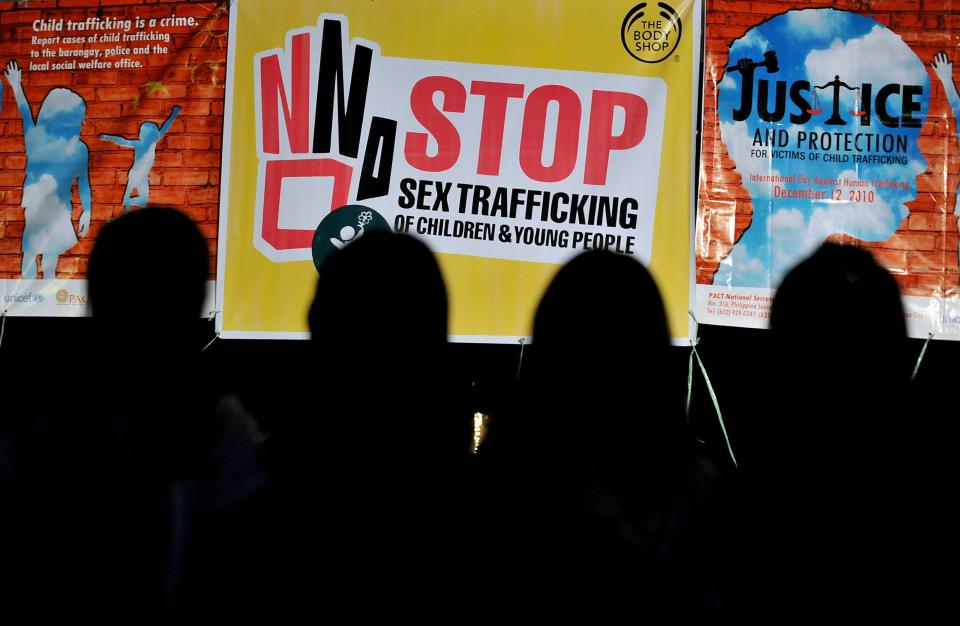From Balenciaga to Disney, companies profit by sexualizing kids – at a horrific price
Balenciaga, the celebrated fashion house, recently made headlines for a campaign featuring young children holding plush teddy bears dressed in sado-masochistic trappings – bondage gear, fishnet shirts and studded leather harnesses and collars.
Balenciaga’s gaffe wasn't an accident – a parallel campaign featured other rotten Easter eggs, like a page from a Supreme Court case on child pornography and a coffee table book on an artist whose artwork depicts children in sexual, macabre and disturbing settings.
The hypersexualization of young children in fashion, TV and social media is not an exception, it’s a worrisome trend that should be triggering a crescendo of warning bells.
Supply and demand in the sex trade
Yet, Balenciaga’s egregious misstep resulted in nothing more than a blip on the radar, another quasi-scandal that further desensitized us to using young children as a means to an adult end. The consequences of our complacency to the sexualization of children are far-ranging – and none more horrifying than the rise in demand for children in the sex trade.
When will brands stop sexualizing kids?: Enough with the skimpy clothes and sick ad campaigns
Hate groups are targeting our children: Here's how you can help to protect them online
Child sex trafficking is mostly portrayed in the media as a distant problem – not one that occurs in the United States – until, inevitably, something happens to remind the general public that sex trafficking is pervasive and that it’s in our backyards.
Enter the recent arrest of “king of toxic masculinity” Andrew Tate on sex trafficking and rape charges. Tate is suspected of luring young women via false promises, subjecting them to physical violence and mental coercion through intimidation, constant surveillance, control and invoking alleged debts, and forcing them to make pornographic videos.
Whether we acknowledge it now or not, the objectification and sexualization of children directly contribute to the silent epidemic of child sex trafficking by fueling demand to purchase minors for sexual purposes.

An American Psychological Association’s report revealed that entertainment, advertising and the internet glamorize the sexualization of children’s bodies, which leads to the exploitation of children for sex.
It’s not just Balenciaga. It’s Benetton. Gucci. Calvin Klein. The fashion industry is riddled with photos and stories of young women who are sexualized, exploited or fetishized.
No TikTok or Twitter. I grew up 'under a rock': My parents banned social media until I was 17. I'm glad they did.
Can we just be honest?: It's time to ghost social media and the billionaires who run it
And it’s echoed across industries – from Disney and Nickelodeon’s hypersexualization of child stars, to TikTok super teens cashing in on their sexuality for careers as fledgling influencers.
Yet, even with repeated red flags launched into the ether, we seem resistant to make the causal link between the sexualization of young children and the rise of sex trafficking – with figureheads like Tate, who has openly admitted to making a lucrative living through the sexual exploitation of young women, at the helm.

Companies profit from cycle of exploitation
We look the other way while corporations sexualize young girls with impunity in a cycle of exploitation – we continue to buy the clothes, watch the shows and use the apps. And, much like the apologue of the frog who was boiled by an incremental increase of the water’s temperature, we won’t realize the danger we’re putting our youth in until the consequences become far too dire.
As images of young people in sexually suggestive contexts subliminally enter minds and cross the blurred boundaries of acceptable norms, our society becomes more and more comfortable with pushing the envelope.
And with increased demand comes increased supply – naturally, the trafficking business is booming. American children are diverted from a bus stop near their foster or group home or on their walk home from middle or high school – or groomed online with gifts and compliments, only to be lured into a cycle of sexual exploitation.
Reform criminal statute of limitations: She was stolen from her parents 51 years ago. How can no one be held responsible?
Over 35 million refugees are children: Don't they deserve a future?
Traffickers, skilled in their trade, are experts at recruitment of minors, misdirection and concealment. They count on the incredulity of adults who are supposed to safeguard children. They count on our complacency. And in looking the other way, we become their conspirators.
Victims of child sex trafficking are the most vulnerable in our society, including runaways and youth in foster care who have already experienced significant trauma. Many of the teens are victims of parental or caregiver abuse, making them more easily tempted into connecting with a trafficker in hopes of escaping an abusive situation at home.
Often, traffickers manipulate traumatized children by offering them housing, food and the type of stability they’ve lacked in previous living situations. Later, perhaps when the child isn't bringing in enough money or tries to leave, the trafficker resorts to physical and psychological violence.
Trafficking victims fall through the cracks
Most of these children aren’t strangers to abuse – accustomed to trauma, they’re less likely to escape the situation even if given a chance. Trafficked children usually don’t call hotlines; some might not even identify as being trafficked.
Without concrete evidence and proper training to ferret out traffickers, authorities to whom these cases are (rarely) reported often fail to act on behalf of the victim. So trafficking victims fall through the cracks and once they age out of their bondage – if they survive it – it’s to make space for the next generation of sex trafficked youth.
Opinions in your inbox: Get exclusive access to our columnists and the best of our columns every day
To stop the cycle, we need to do more than simply criminalize and prosecute sex trafficking. We need to get to the root of the problem: It is incumbent upon us to reject the notion that sexualizing children is acceptable in any way.
Human trafficking can never be obliterated, but ending the tolerance and normalization of children as sexualized objects might lead to a decrease in the child sex trafficking industry.
Studies researching various methods for reducing sex trafficking have already demonstrated that society’s collective beliefs about what’s right and wrong can shape individuals’ behaviors surrounding sex purchasing. If we, as a society, heavily stigmatize the sexualization of children in any way – attacking the very nature and desire to view a child as a sexual object – then we can stem demand.
Opinion alerts: Get columns from your favorite columnists + expert analysis on top issues, delivered straight to your device through the USA TODAY app. Don't have the app? Download it for free from your app store.
Changing norms can begin with widespread public awareness, and that means reframing the mindset that too often commodifies and objectifies children.
We must call for true financial accountability for the Balenciagas and Disneys of the world, and not allow the scapegoating of third-party actors while keeping the usual suspects unscathed and in power. In the end, for renorming to be most effective, the process should happen at all levels – early in the home and in schools and continue into young adulthood and beyond.
Until we interrupt the hypersexualization of children, every child is at risk. Refusing to see the truth about how objectification of children exploits our most vulnerable population not only hurts all children in the long run, it also delays the solutions we need to fix the problem.
The sexualization of young children contributes significantly to an epidemic, one that is impossible to unsee.
Melissa L. Breger is the President William McKinley Distinguished Professor in Law and Public Policy at Albany Law School. She's the editor of the book "Exploring Norms and Family Laws across the Globe" and author of the studies "Stemming the Tide: Social Norms and Child Sex Trafficking," "Healing Sex-Trafficked Children: A Domestic Family Law Approach to an International Epidemic" and "Trauma in Sex-Trafficked Children."
You can read diverse opinions from our Board of Contributors and other writers on the Opinion front page, on Twitter @usatodayopinion and in our daily Opinion newsletter. To respond to a column, submit a comment to letters@usatoday.com.
This article originally appeared on USA TODAY: Disney, TikTok sexualize kids. Their content fuels sex trafficking

